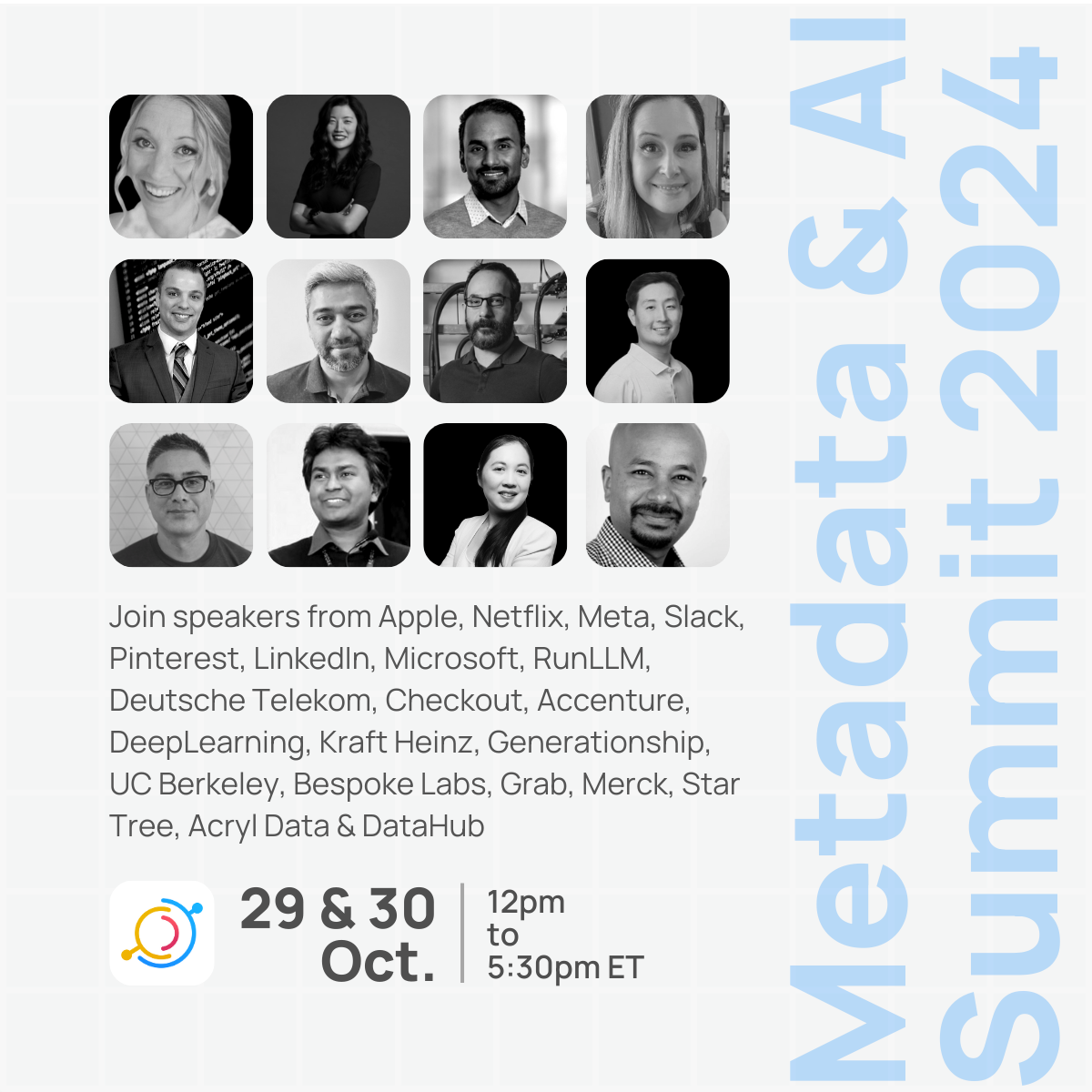ICYMI:
Highlights from the Metadata & AI Summit 2024
The Metadata & AI Summit 2024 just wrapped, and I gotta say, this was an absolutely stellar two full days of talks! The agenda was jam-packed with sessions led by industry experts, focused on providing practical advice and actionable insights to help you navigate the complex and deeply powerful intersection of metadata + AI.

We had over 2,500 data pros and industry leaders join us online to hear from companies like Apple, Netflix, Meta, Slack, and more; I’m still trying to wrap my head around how far-reaching and impactful these two days were!
In case you missed it, we’ve got a quick recap of a few of the impactful sessions and key takeaways for you right here!
Top sessions to watch on-demand
If you’re early in your metadata + AI journey, be sure to check out the Metadata in Action—Tips and Tricks from the Field panel. I sat down with experts from Checkout.com, Slack, and Grab to learn about their field-tested strategies for integrating metadata into everyday workflows. It’s packed with lessons learned and practical guidance to help you kick things off!
Netflix’s Metadata Journey session blew me away — it’s always so dang cool to get a behind-the-scenes look at how the teams scale metadata practices, particularly at Netflix-scale.
Michelle Yi (Co-Founder, Generationship) led a session on Building Trustworthy AI Systems; Joey Gonzalez (Co-Founder, Head of AI at RunLLM) gave us a look ahead with a Forecast for Generative AI; and Joe Reis (Instructor at Deeplearning.ai) presented a master class on Why Metadata is Key to Cross-Disciplinary Data Modeling.
We’re only scratching the surface here — check out our YouTube playlist to find all of the talks!
Notable Takeaways on Metadata and AI
At the summit, attendees delved into various topics, including generative AI trends, the importance of AI governance, and strategies for elevating data quality throughout organizations. Discussions also focused on metadata management in AI, the future of open-source in AI, and innovations in real-time data processing. Additionally, participants explored emerging data management and analytics trends, along with best practices for building, deploying, and scaling AI models, providing a comprehensive overview of the current data management and AI landscape.
Several key topics emerged from the “Think Day” discussions on the first day of the event, such as AI advancements, strategies, and trends. On day two, “Build Day” sessions focused on practical implementations and real-world success stories, helping participants apply what they had learned to their own projects. These conversations emphasized the vital role of metadata in AI and data management, showcasing practical strategies and innovative approaches. Topics ranged from developing trustworthy AI systems to examining users’ metadata journeys, offering valuable perspectives for industry professionals.
Here’s a breakdown of the top insights from these sessions.
1. The importance of AI-driven metadata management
AI-driven metadata management is crucial for organizations seeking to harness the full potential of their data. By automating metadata processes, AI enhances data discovery, improves data governance, and ensures accuracy across diverse datasets. This approach not only streamlines workflows but also enables better decision-making by providing rich context and insights. As businesses increasingly rely on data to drive innovation, adopting AI-powered metadata management becomes essential for maintaining data quality and fostering trust in AI applications.
2. What you can learn from real-life case studies
We heard from industry leaders like Apple and Deutsche Telekom, highlighting real-world applications of AI-driven metadata management. My panel discussion with Nedra Albrecht (Sr. Data Engineer, Slack), Matthew Coudert (Data Engineer II, Checkout.com), and Harvey Li (Engineering Manager II, Grab) offered practical guidance and lessons learned on implementing a metadata program. This blend of theory and practice provided a well-rounded understanding of current trends in metadata and AI.
3. Strategies for democratizing AI at scale
Democratizing AI at scale involves implementing strategies that empower diverse teams to leverage AI tools effectively. Key approaches include providing accessible training programs, establishing clear governance frameworks, and integrating AI into everyday workflows. Additionally, fostering a culture of collaboration and innovation can help break down silos, ensuring that all employees, regardless of technical expertise, can contribute to AI initiatives. By focusing on transparency and user-friendly interfaces, organizations can maximize the impact of AI across all levels, driving better outcomes and accelerating growth.
4. Focus on data quality and trust
Data quality and trust are fundamental to successful AI initiatives. High-quality data ensures accurate insights, enabling organizations to make informed decisions. Establishing trust in data involves transparent processes for data collection, storage, and usage, allowing stakeholders to feel confident in the information-driving AI models. By prioritizing data quality and trust, businesses can enhance collaboration, improve operational efficiency, and ultimately foster a culture that embraces data-driven innovation. Investing in these areas not only bolsters AI effectiveness but also strengthens overall organizational integrity.
5. What to watch around AI and metadata moving forward
Looking ahead, the intersection of AI and metadata will continue to evolve, driven by innovations and emerging technologies. As organizations strive for smarter, more efficient data management, the importance of robust metadata frameworks will grow. Key areas to watch include the integration of AI in metadata tools, advancements in data governance, and the increasing demand for data quality and trust. Staying informed about these trends will be crucial for businesses aiming to leverage AI effectively in their operations.
Closing thoughts on this year’s Metadata & AI Summit
The Metadata & AI Summit 2024 highlighted the crucial role of AI-driven metadata management in shaping our data landscape. Attendees explored effective strategies for democratizing AI at scale and the importance of maintaining data quality and trust. Real-life case studies provided actionable insights, while discussions about the future of AI and metadata left us with much to anticipate. As we move forward, these conversations will guide us in harnessing the full potential of our data-driven initiatives. Looking forward, staying attuned to developments in AI and metadata will be essential for effectively leveraging data. We’re excited to continue this journey together and explore the possibilities ahead!
Recommended Next Reads

